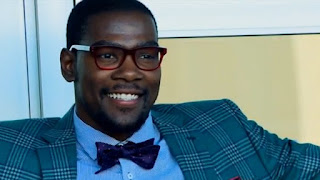Many of you have probably seen the movie "Up" and recognize this picture for today's blog. If you are anything like me with young ones at home, it also can describe your children at any moment. Unfortunately it is also something that plagues candidates I work with on a daily basis.
Instead of squirrels, there is a laundry list of distractions that candidates encounter during an interview or job search process. Personal issues, work issues (if currently employed), changes in an interview schedule, new opportunities that arise, comparisons of two (or more) job interviews, doubt, fear, surprises, concerns, questions.......the list goes on and on.
So how does one handle those external pressures and white noise to stay focused? I turn to the world of golf for some answers. For those of you that might not have seen the final round of the U.S. Open yesterday, something amazing happened that included one of the biggest distractions I have ever seen in a major championship. Dustin Johnson was getting set to make a putt on the fifth hole. The ball moved, he asked a rules official to come over to talk through a possible penalty, and they agreed that there would be no penalty. He made the par putt and continued his round. Only to have another rules official approach him on the 12th hole to let him know a possible one-stroke penalty could be assessed at the completion of his round. They also let all other officials and golfers know so that they could strategize accordingly to finish their round. Which obviously set up a chance for an enormous controversy depending upon how things shook out. Fortunately for everyone, Dustin went on to finish three strokes ahead of the field, even with the one-stroke penalty assessed after the 72nd hole.
Here's how he did it:
1)
He controlled the controllables. That is actually a phrase that one of the announcers (Paul Azinger) talked about during that treacherous six-hole stretch when the final outcome was in question. Dustin never wavered, made some crucial par putts, and even birdied the final hole to put an exclamation mark on his championship. The same can be said for a candidate in the midst of a changing interview process with plenty of distractions. Do not become frustrated if the process goes longer than expected. Do not waver in your professionalism if something goes wrong on your interview day. If it rains and ruins your perfect hair going into the interview, stay in control and give your best interview. It is much easier said than done, but such sage advice - control the controllables.
2)
He learned from his failures. If you rewind a year, history will show that Dustin had a chance to win on the 72nd hole of the U.S. Open. Instead, he three-putted the final hole, including a very short putt to force a playoff, and remembered that going into this year. It is likely that your past interview history is not perfect, and that is okay. Remember back to when something didn't go quite right and think about what you took from that experience. Maybe it was even recent and you are still stinging from it. Use that to your advantage to fuel your future job search activities.
3)
He had support from others. In an amazing display of professionalism, Lee Westwood (Dustin's playing partner for the day), patted him on the back after the rules official let him know of the pending bad news. This is a competitor of his, vying for the same trophy, who just so happened to be in the middle of a terrible round where he played himself out of contention. He encouraged Dustin to stay focused, was his biggest cheerleader during the final six-hole stretch, and even Lee's caddy made a gesture at the end praising Dustin's efforts. If you have the luxury of a good support system around you with mentors, other professionals, or friends and family, you should absolutely lean on that in the midst of the distractions that come with a search. If you do not have that luxury, try and find someone that could be that person for you. Even if it is someone you don't know personally. Read a good business book from a reliable author, check online for resources and ideas, or even look to social media. There is so much content available on the "do's and don'ts" of a search or interview process that you'll be able to easily find a source of help or focus.
The world is full of distractions. The sooner you acknowledge them and overcome them, the more success you will have in your search. Or even life in general. Here's to hoping that "squirrel" doesn't prevent you from achieving success!





